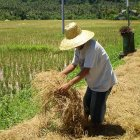Jun 10 2008
Chinese scientists have developed a new method that dramatically increases the yield of a clean biogas fuel from rice straw.
 A farmer surrounded by rice straw after harvest.
A farmer surrounded by rice straw after harvest.
China is the world's largest rice producer and the industry results in 230 million tonnes a year of surplus rice 'straw' — the stem and leaves left behind after harvesting. Farmers often burn the straw, increasing pollution and carbon dioxide emissions (see Stalk burning fuels China pollution woes).
Until now, using the straw to produce ethanol or biogas — a mix of methane and carbon dioxide — by anaerobic digestion with microorganisms has been disappointing. The complex structures of the straw's cellulose and lignin components make it hard for the microorganisms to break them down.
Author Li Xiujin, an environmental engineering professor at Beijing University of Chemical Technology, explains that researchers soak the straws in alkali to kick-start the breakdown process.
But that method means recycling chemicals, disposing of waste solutions and heating to a high temperature — involving high facility investment and treatment costs, and a risk of environmental pollution, he says.
Rather than soaking the rice straw, Li's team treated it with a small amount of alkaline solution containing six per cent sodium hydroxide.
They found that this significantly increased straw biodegradation, and improved biogas output by 64.5 per cent.
Li told SciDev.Net that farmers could make 20 yuan (US$3) additional profit from producing biogas by this method, which would encourage its uptake.
The research provides a boost for biofuels made from waste products — an important factor, given worries over biofuels' impact on food security. And generating environmentally friendly biogas from farm waste instead of burning it will counter environmental concerns.
Jin Jiaman, director of the Beijing-based Global Environment Institute, welcomes the study, saying it could help tap biofuels in rural areas.
But it might not necessarily bring wider use of biogas, which would need government subsidies to install facilities and lay pipelines into rural households.
"The big labour input needed for processing straws could also dampen farmers' zeal to use biofuels," Jin told SciDev.Net.
The research was published online last month (14 May) in the American Chemical Society's journal Energy & Fuels.